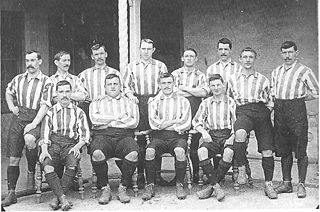
Michael John Giles is an Irish former association football player and manager best remembered for his time as a midfielder with Leeds United in the 1960s and 1970s. After retiring from management in 1985, Giles served as the senior analyst on RTÉ Sport's coverage of association football from 1986 until 2016. The FAI voted Giles as the greatest Irish player of the last 50 years at the UEFA Jubilee Awards in 2004.
Michael David Jones is an English former footballer who played as centre forward with Leeds United during the 1960s and 1970s. He was also capped for England.
Trevor John Cherry was an English footballer who notably captained both England and Leeds United. A defender, Cherry also played for Huddersfield Town and Bradford City, and managed the latter club.

Terence Cooper was an English football player and manager. He was a left back in the Leeds United team of the 1960s and 1970s, and featured for England at the 1970 Mexico World Cup. He later went on to manage both of Bristol's football teams, Birmingham City and was twice manager of Exeter City.
Paul Edward Madeley was an English footballer, who played for Leeds United and the England national team. During his career with Leeds, Madeley played in a variety of different playing positions which led to him being described as a Utility player. Madeley made more than 500 appearances for Leeds in the Football League and appeared in 24 internationals for England between 1971 and 1977.
Robert Young Collins was a Scotland international football player, best known for his successful spells at Celtic, Everton and Leeds United.

Thomas James Wright is a former footballer who played as a right-back. A one-club man, he played for Everton, with whom he won the Football League and the FA Cup, and represented England, including at the 1970 FIFA World Cup.
Sydney William Owen was an English football player and coach. He spent nearly all his playing career as a centre half for Luton Town.

Terence Charles Yorath is a Welsh former football player and manager at both club and international level.
George L. Hannah was an English footballer who played as a forward.
Alan Peacock is an English former footballer.
Graham Frederick Cross is a former professional footballer and cricketer. He is the record appearance holder for Leicester City, making 600 appearances for the club in all competitions.
Robert Carmichael Mitchell, nicknamed "Bobby Dazzler", was a Scottish footballer who played as an outside left.

Fionan "Paddy" Fagan was an Irish footballer who played as a winger.

Alfred Ernest Priest was a professional footballer from the North East of England who won the 1899 and 1902 FA Cup finals with Sheffield United.
Terence Arthur Hibbitt was an English footballer who played for Leeds United, Newcastle United and Birmingham City. His brother Kenny was also a footballer. He died of cancer in 1994, aged just 46.

Michael McGrath is an Irish former professional footballer who played as a left half.
James Storrie was a Scottish professional footballer and manager, best known as a centre forward who helped Leeds United gain promotion in 1964 to the First Division.
Robert Cowell was an English football defender. During his football career he only played for one club, Newcastle United. Despite his success with Newcastle he failed to win any caps for the England national team.
James Husband was an English professional footballer who played in England and the United States as a forward.






